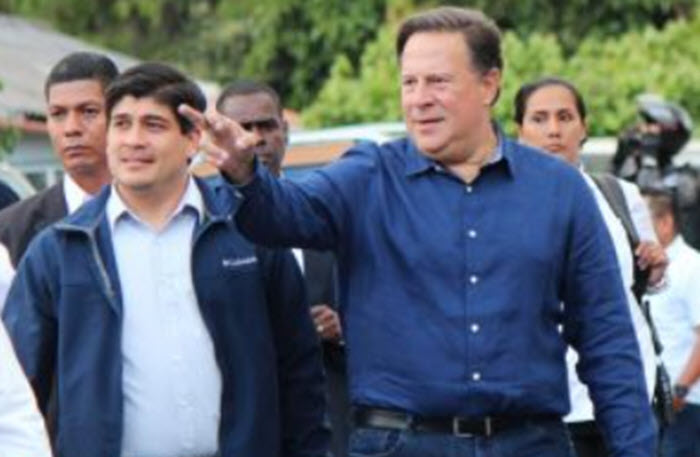Last week, I could barely get back into Panamonte Estates as Panama President Varela was meeting with Costa Rica President Alvarado at the Panamonte Hotel and the security forces were huge and very formidable.
They met there and called for dialogue as the way to overcome the crisis that has engulfed Nicaragua since last April. Meeting on Wednesday, February 20, the two heads of state also spoke of the need to investigate the hundreds of deaths that have resulted from the socio-political crisis.
The topic of Nicaragua was one among many on the two leaders’ agenda during a work meeting that took place in the Panamanian town of Boquete, located in the province of Chiriqui, near the border with Costa Rica. They also dealt with other issues of bilateral interest, such as the flow of migrants, regional security and tourism.
“We touched on the topic of Nicaragua, where we fervently hope that the violent situations and losses of life that occurred are not repeated and that they be investigated,” Varela declared in a joint press conference with Alvarado.
The Panamanian president expressed his fervent wish that “our brothers and sisters in Nicaragua can find the road to peace in democracy.”
At the same time, Costa Rican President Alvarado indicated that his administration “advocates for dialogue and democracy,” in the neighbor country. For a number of years now Costa Rica has maintained a complex relationship with their northern neighbor due to border conflicts.
Nicaragua has been engulfed in a crisis since April 2018; the protests initially broke out over social security reforms, but later turned into demands for the resignation of President Daniel Ortega, and of his wife and Vice President Rosario Murillo. The two have been accused of being responsible for the hundreds of deaths that were registered during the crisis.
Plan to face the irregular flow of immigrants
The governments of Panama and Costa Rica reaffirmed this Wednesday their commitment to control the growing flow of irregular immigrants seeking a route to the United States. They foresee carrying out this task with the greatest amount of order to guarantee safe, peaceful transit.
In the past weeks, the immigration drama has played out in the Darien jungle along the border with Columbia, where a large influx of people are trying to enter Panama. Most of these immigrants were Cuban and Haitian; the situation triggered an alert for the authorities.
Given this, the leaders of both nations agreed to reinforce the bilateral program Controlled Flow, with the goal of guaranteeing humanitarian attention for the migrants without neglecting the actions that form an inherent part of the struggle against human trafficking.
After Panamanian President Juan Carlos Varela, and Costa Rican President Carlos Alvarado signed a joint declaration at the Binational encounter covering the topics of security, migration, commerce, tourism and mutual cooperation, they referred to the actions that they had taken on the social issue.
“Citizens – both from the region and outsiders – must obey the laws and complete their transit in the orderly and controlled established form,” Varela declared, in reference to the program of migratory cooperation.
He added that both states must apply sanitary and safety regulations to control the flow of people of a number of nationalities. In addition, they must indicate to the migrants their responsibilities, since they’re being directed by a government and are not part of a human trafficking network.
In the last few days, Panama has had to arrange the transit of over 700 irregular migrants: 57% of them Cubans, and the rest from countries including Haiti, Cameroon, Ghana, Eritrea and Ethiopia. All of them reached the Central American country on foot and seek transit through to the border with Costa Rica in order to continue northwards to Mexico and the United States.
Varela explained that the migrants Panama received are taken to a small shelter in the coastal area of Puerto Obaldia or in Yaviza in the Darien province on the border with Colombia; they’re then dispatched to Costa Rica in an orderly fashion, including registering their identification and fingerprints.
The Head of State added that both nations maintain controls in order not to expose those in transit to human traffickers, or involve the local population in situations that would damage the country’s image and economy.
Meanwhile, Alvarado emphasized that the flow model they were implementing allowed a safe, orderly and documented standard of migration that has allowed them to eliminate the phenomenon of coyotes or illegal trafficking of people.
“We believe in overseeing orderly migrations with a focus on human rights, given that the population that is seeking transit includes minors and pregnant women,” he stated.
Humanitarian crisis
The massive arrival of Cubans in 2015 and the closing of the border to enter Nicaragua generated an unprecedented humanitarian crisis in Panama and Costa Rica.
In the work session held in the town of Boquete in the western province of Chiriqui, the presidents spoke about a democratic way out of the Venezuelan crisis through dialogue.
These countries make up the so-called Lima Group which doesn’t recognize Maduro’s second term and demands credible and democratic elections in Venezuela.
Another of the topics taken up by both leaders was the fight against drug trafficking, given the increased production of drugs in the neighboring countries. They discussed their capacity for intensifying the presence of the security forces in the Pacific zone, the route most often used by the criminal networks to ship drugs.
In addition, the political dialogue proved a good moment to delve into the topic of promoting tourism to both countries as a joint destination, in order to attract more visitors from the United States, Europe and Asia, and in this way encourage a connection.
The leaders also spoke of the modernization of the customs posts, trade relations, initiatives for the National Friendship Park, the progress of the international bridge over the river Sixaola and the Mixed Commission for Cooperation.
